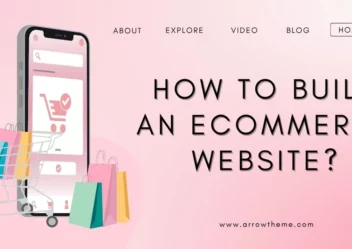Magento Websites: Top 10 Brands Using Magento for eCommerce
Magento is a leading e-commerce platform. This platform powers over 250,000 online stores globally. With its scalability, flexibility, and robust features, Magento is trusted by major brands across industries. We can list the names of giants like Nike, Coca-Cola, Ford, etc.
In this article, ArrowTheme highlights ten top brands that are using Magento for eCommerce to drive their Magento Websites’ success.
Claue – Clean and Minimal Magento Theme
We provide an amazing Magento theme with fast and responsive designs. Let’s find out!
Rossignol – Ski Gear and Apparel

Rossignol is the iconic French winter sports brand. It embarked on an ambitious digital transformation by adopting Magento to drive its e-commerce strategy. Their journey stands as a compelling case study of how legacy brands can modernize and streamline operations.
Established in 1907, Rossignol is synonymous with skiing and winter sports innovation. However, like many traditional brands with a longstanding heritage, Rossignol faced the challenge of updating its digital presence. The brand’s earlier eCommerce setup was split between a separate CMS and an outdated eCommerce system. These characteristics created operational inefficiencies and hampered the ability to deliver a seamless customer experience.
Magento website gave Rossignol a unified platform that could integrate with their existing enterprise systems. With Magento at the core, the brand seamlessly connected its ERP, product information management (PIM), and warehouse systems. This integration helped every stakeholder, ranging from marketing and sales to customer service, to work on the same backend, streamlining processes and reducing operational headaches.
As Damien Hars, Head of Digital Marketing & eCommerce at Rossignol, noted, the move to Magento meant that “every person working on eCommerce is using the same platform.”
Rossignol applies Owebia for shipping management, Maxmind for geo-location, and Hipay for payment processing. Based on that, customers worldwide can experience the best-in-class, consistent shopping.
Within just four months, the new Magento-based website was live in eight countries, supported in four languages and currencies. Rossignol reported a 70% increase in conversion rates alongside an overall doubling of online sales compared to the previous platform.
Coca-Cola – Famous Carbonated Water Brand
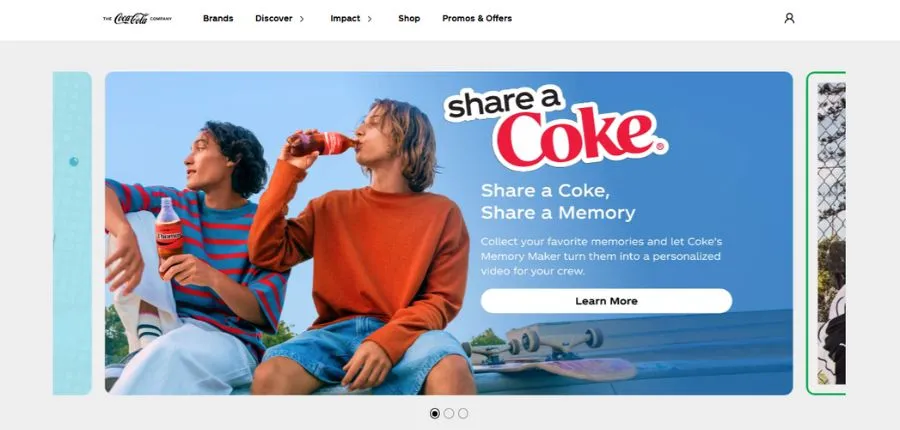
Coca-Cola has strategically leveraged Magento across various markets. Since adopting Magento in 2014, the company has utilized the platform to sell a diverse range of branded merchandise, including apparel, accessories, and collectibles, through its online store.
The Coca-Cola site has personalized recommendations, streamlined checkout processes, and multilingual support for a seamless shopping experience. The company’s online store is still outstanding with its brand identity – the iconic red and white color scheme.
In the Latin American region, Coca-Cola deployed Magento 2, integrated with Adobe Experience Platform, Adobe Target, and Adobe Analytics, to significantly improve the digital user experience. This integration led to a 45% increase in new account registrations and an 18% rise in average order value within a year. Additionally, during the COVID-19 pandemic, the platform facilitated efficient water delivery to remote areas.
Coca-Cola also employs Magento for its B2B operations. The brand is utilizing the platform’s capabilities to manage complex pricing models and integrate its extensive distribution network.
Helly Hansen – Global Outdoor Clothing Retailer
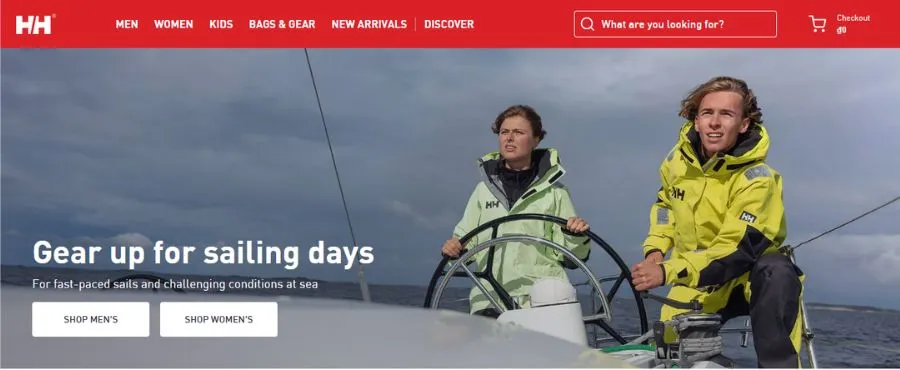
Helly Hansen is a renowned Norwegian outdoor apparel brand established in 1877. This brand has significantly enhanced its global eCommerce operations by adopting Magento in 2016. This strategic move helped the company to consolidate over 55 localized websites under a unified platform. Each is tailored with specific languages, currencies, and shipping rules to effectively serve diverse markets.
The transition to Magento yielded impressive results. Helly Hansen quickly increased traffic by 24 percent, boosted their mobile traffic by 48 percent, and increased their overall revenue by over 45 percent.
To further enhance content management and user experience, Helly Hansen integrated Adobe Experience Manager and Adobe XD into their digital ecosystem. This integration streamlined the deployment of localized content and marketing campaigns. It ensures consistency and efficiency across all digital touchpoints.
Embracing a mobile-first approach, Helly Hansen prioritized mobile optimization in their design and user experience strategies. This focus aligns with the increasing trend of mobile commerce. Customers can receive a seamless shopping experience regardless of device.
Ford – Car Accessories and Merchandise
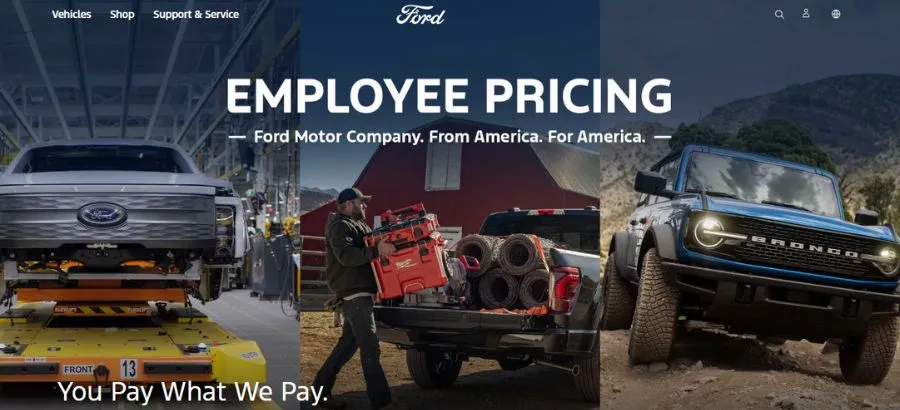
Ford Motor Company has utilized Magento for its online store to sell vehicle parts and accessories. On this platform, customers can explore and purchase genuine Ford accessories tailored to their specific vehicle models or years of manufacture.
By leveraging Magento’s capabilities, Ford provides a user-friendly interface. Customers easily navigate through various product categories to find the right accessories for their vehicles. The platform’s scalability and flexibility support Ford’s extensive product catalog and accommodate the company’s global customer base.
Moreover, this strategic implementation of Magento aligns with Ford’s commitment to delivering high-quality products and services.
Jaguar Land Rover – Parts and Lifestyle Products

JLR developed a custom Magento solution that aligns with the distinct identities of both the Jaguar and Land Rover brands. This platform supports the sale of branded merchandise, vehicle accessories, and collectibles.
Customer experience is enriched by features such as personalized product recommendations, streamlined checkout processes, multilingual and multi-currency support. Customers worldwide receive a tailored and efficient shopping experience.
The implementation of Magento led to notable enhancements in JLR’s e-commerce performance. Mobile revenue increased 145%, year-over-year holiday sales rose 250%, and traffic associated with API and webhook calls increased 85%.
Nike (Some Regional Stores)
While Nike’s globally recognized main website (nike.com) isn’t built on Magento, this platform is deployed in some regions. These websites leverage digital innovations and direct social commerce (for example, the Magento-powered Facebook Commerce store in Australia). They benefit from Magento’s flexibility and integration capabilities.
Such implementations drive targeted campaigns, support augmented reality features, and create a personalized shopping experience, thus improving conversion rates.
In 2024, Nike reported global revenues of approximately $51.4 billion. The critically effective digital channels played a role in this success.
Sigma Beauty – Cosmetics and Accessories
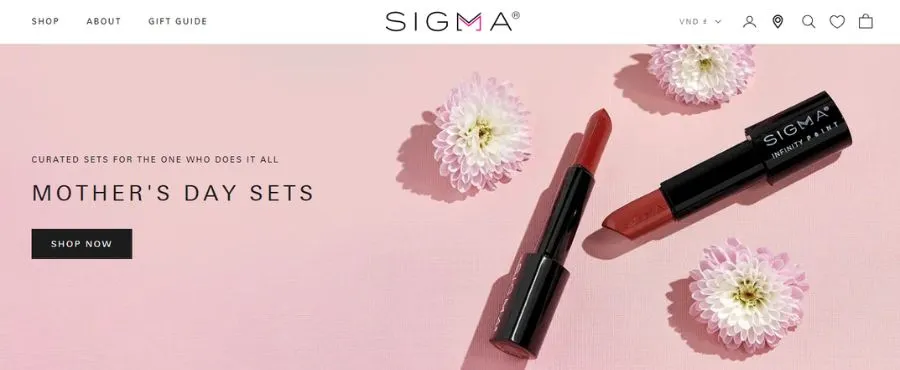
In 2017, Sigma Beauty launched a unified B2B and B2C platform on Magento Commerce Cloud 2.2, marking a significant milestone in the beauty industry’s digital transformation.
Sigma Beauty adopted Magento 2.2, which gave it advanced features. Magento Business Intelligence permits this brand to make data-driven decisions through intuitive dashboards and comprehensive reporting. Additionally, the platform’s robust SEO capabilities improved the brand’s online visibility, leading to increased organic traffic and sales.
Sigma Beauty’s Magento-powered website also showcases the platform’s flexibility, featuring a multilingual interface that caters to a diverse global customer base. Additionally, it integrates various payment systems and logistics services to meet specific market needs.
Monin – Flavored Syrups and Beverages
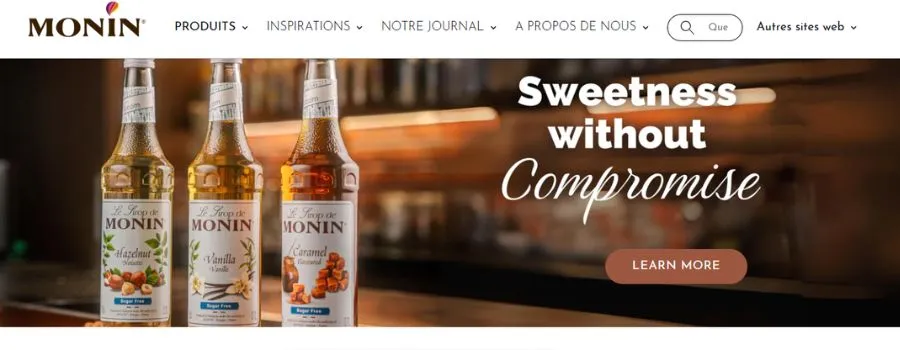
Monin, a globally French brand specializing in gourmet syrups, sauces, and beverage flavorings, has effectively leveraged Magento to enhance its e-commerce operations.
In 2013, Monin adopted Magento Commerce 1 to support its online presence. This move facilitated a consecutive increase in eCommerce revenue over four years.
Recognizing the need for modernization, Monin transitioned to Magento Commerce 2 in 2018. This brand aims to improve system architecture, coding standards, and workflow efficiencies. This upgrade also provides better integration with their email marketing partner and boosts their digital marketing strategies.
In 2021, Monin revamped its website’s front end using a Progressive Web App (PWA) built with React, while maintaining Magento 2 for backend operations. This approach improved site performance and user experience, particularly on mobile devices.
When you visit Monin’s website, you can receive a rich, content-driven experience. Features include recipe sections with instructional videos, a ‘Tips & Techniques’ area for beverage preparation guidance, and a culinary blog integrated via WordPress.
Olympus – Cameras and Accessories
Olympus is a household name in photography and imaging, with a history spanning nearly a century. Known for its innovative cameras, lenses, and even medical equipment, the company serves both professional photographers and medical professionals. To maintain its premium brand image and manage an extensive product range, Olympus needed a comprehensive and flexible eCommerce solution.
Magento Enterprise serves high-volume, multi-channel operations. Olympus benefits from Magento’s ability to handle thousands of SKUs across different product categories – from cameras and lenses to specialized imaging and medical devices. The platform’s modular architecture supports Olympus to customize the user experience and easily scale its operations as market demands evolve.
Nestlé Nespresso – Coffee and Related Products (Some Markets)
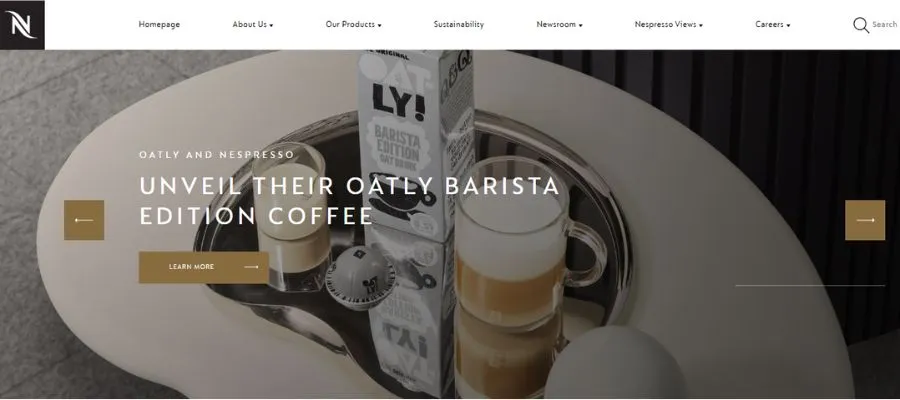
Nespresso is a flagship brand within the Nestlé Group. Known for its innovative approach to coffee culture, Nespresso’s online presence needed to mirror its high-quality, luxurious brand image.
As a brand with a strong international footprint, Nespresso benefits from Magento’s multi-store functionality. This feature assists the company in operating various storefronts tailored to different regional markets under a single, unified backend.
By using Magento, Nespresso can connect its eCommerce platform with critical backend systems such as inventory management, ERP, and CRM solutions.
Conclusion
The top 10 brands using Magento for e-commerce demonstrated the platform’s exceptional versatility and power to drive digital success for global leaders. These Magento websites span from renowned sportswear and automotive brands to innovative beauty and lifestyle retailers. Magento empowers these businesses to manage vast product catalogs, integrate with sophisticated back-end systems, and deploy targeted marketing strategies across multiple regions.
Read more: Magento Web Development: How to Develop an E-commerce Site
Contact US – ArrowTheme:
– Email: [email protected]
– Facebook: Facebook.com/ArrowThemeTeam
– Website: ArrowTheme.com



